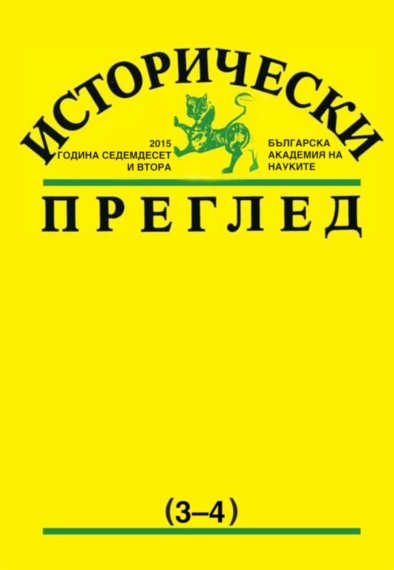Създаване и запазване на колективната памет за военни конфликти в османската погранична периферия: битките на Михай Витязул с Османската империя по време на войната със Свещената лига (1593–1606)
Creating and preserving the collective memory of war conflicts in the Ottoman border periphery: the battles of Michael Viteazul with the Ottoman Empire during the War of the Holy League (1593–1606)
Author(s): Stefka ParvevaSubject(s): History, Diplomatic history, Military history, Political history, Middle Ages, Modern Age, Special Historiographies:, 15th Century, 16th Century, 17th Century, 18th Century, 19th Century, The Ottoman Empire
Published by: Институт за исторически изследвания - Българска академия на науките
Keywords: Michael Viteazul;Ottoman border;collective memory;folclore;Silistra;
Summary/Abstract: This study focuses on some aspects of the ways and mechanisms for preserving the memory of traumatic events during military conflicts among the subjects of the Sultan. These aspects have to do with the functioning of the Ottoman bureaucratic, judicial and military institutions on local and central level, and communication with the local population. For this purpose, the study analyzes the case with the citizens of Silistra and their conduct, as well as that of the Ottoman authorities, during and after the war with the Holy League in 1593–1606 and the late 17th century. The analysis of the sources reveals that the process of preserving and passing on the information involved functionaries from all levels of the Ottoman hierarchy and that various bureaucratic practices were applied related to the registration and taxation of the population, and to the creation of formal and informal archival collections. There were several ways of preserving and passing on of the memory: by means of written communication among the institutions (through document flow toward the centre and back to the provinces); by oral communication between the representatives of the authorities and taxpayers in the kadı court, and discussions among the members of the community and its elders who attended the court sittings. Written evidence of the war events, or more specifically, of the feelings that overwhelmed the people and the disturbing thoughts that haunted them in those troubled times was left by a number of literate Bulgarians in marginal notes on pages of liturgical books and even on church walls. These short notes testify that the clash between the warring armies did not bring any hope to the Christians, but only fear in their souls and awareness of the trouble that had befallen them in those “severe and turbulent times”. Finally, the folklore also provides information about the war, transforming in a specific way the memory of events and people, people’s attitude towards the afflictions that befell on them. The analyzed sources show that the memory which the Bulgarians have preserved and transmitted to next generations is charged with predominantly negative assessment of the traumatic events during the war and of Michael Viteazul’s image. It seems that the scope of the devastation and the suffering caused by the Wallachian armies to the Christian population were a stronger factor in the process of constructing the collective memory of the events than the war victories of the Voivode over the Ottoman ruler in the lands south of the Danube. That is why the themes of killing, enslavement and displacement of the population as well as the motif of the unforgivable sin of Voivode Michael stand out in the Ottoman documents, in the marginal notes, and the folk songs.
Journal: Исторически преглед
- Issue Year: 2015
- Issue No: 3-4
- Page Range: 5-35
- Page Count: 31
- Language: Bulgarian
- Content File-PDF

